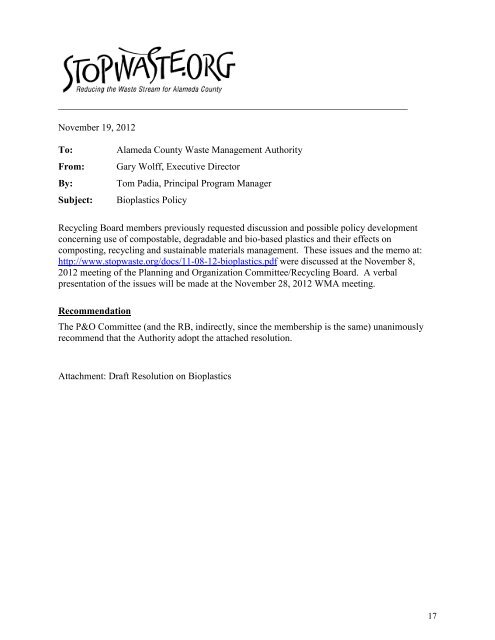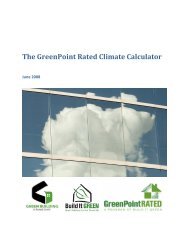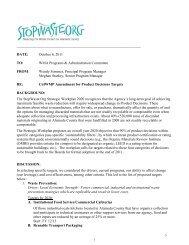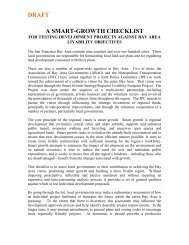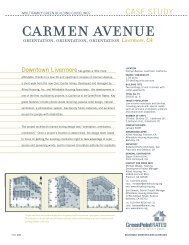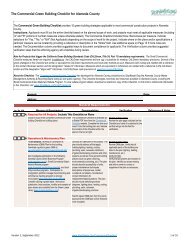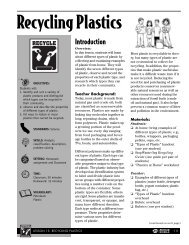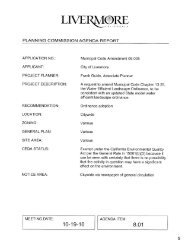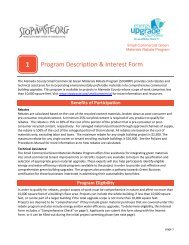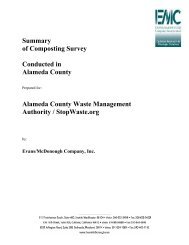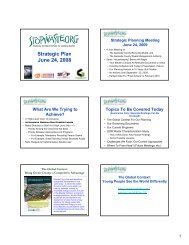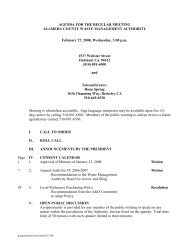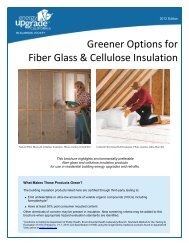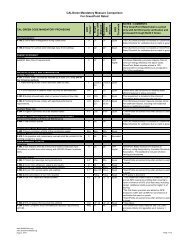MINUTES OF THE JOINT MEETING OF THE - StopWaste.org
MINUTES OF THE JOINT MEETING OF THE - StopWaste.org
MINUTES OF THE JOINT MEETING OF THE - StopWaste.org
You also want an ePaper? Increase the reach of your titles
YUMPU automatically turns print PDFs into web optimized ePapers that Google loves.
________________________________________________________________________November 19, 2012To:From:By:Subject:Alameda County Waste Management AuthorityGary Wolff, Executive DirectorTom Padia, Principal Program ManagerBioplastics PolicyRecycling Board members previously requested discussion and possible policy developmentconcerning use of compostable, degradable and bio-based plastics and their effects oncomposting, recycling and sustainable materials management. These issues and the memo at:http://www.stopwaste.<strong>org</strong>/docs/11-08-12-bioplastics.pdf were discussed at the November 8,2012 meeting of the Planning and Organization Committee/Recycling Board. A verbalpresentation of the issues will be made at the November 28, 2012 WMA meeting.RecommendationThe P&O Committee (and the RB, indirectly, since the membership is the same) unanimouslyrecommend that the Authority adopt the attached resolution.Attachment: Draft Resolution on Bioplastics17
ALAMEDA COUNTY WASTE MANAGEMENT AUTHORITYRESOLUTION #WMA 2012 -xxMOVED:SECONDED:AT <strong>THE</strong> <strong>MEETING</strong> HELD NOVEMBER 28, 2012POLICY RESOLUTION REGARDING PURCHASE, USE AND DISPOSITION <strong>OF</strong>COMPOSTABLE PLASTICS, DEGRADABLE PLASTICS, AND BIOPLASTICSWHEREAS, there is extensive confusion regarding the environmental impacts and attributes ofcompostable plastics, degradable plastics and bioplastics (i.e. polymers derived from renewableplant sources); andWHEREAS, consumers may purchase specific products or packaging in the belief that thematerial in question is more “sustainable” or environmentally preferable, but the facts may notsupport that conclusion; andWHEREAS, degradable additives potentially endanger post consumer plastic recycling since itremains unclear how these additives might affect the many next-life products made fromrecycled materials in terms of quality, performance, safety, and lifespan; andWHEREAS, degradation of plastics provides no nutrient value to the environment in which itdecomposes; andWHEREAS, degradation of plastics solves no solid waste management problems, includinglitter, since degradation does not necessarily happen quickly or reliably in likely end-of-lifeenvironments, even for products containing degradable additives; andWHEREAS, questions have arisen regarding these materials, specifically:• Are “compostable” plastics desirable as a feedstock to municipal composting facilities?• Are “degradable” plastics environmentally preferable to traditional plastics?• Are “bio-based” plastics environmentally preferable to “fossil fuel” based plastics?• What should we do when we suspect that plastics labeling or advertising is deceptive?;NOW <strong>THE</strong>REFORE, BE IT RESOLVED that the Alameda County Waste ManagementAuthority hereby:1. Reaffirms the materials hierarchy of “Reduce, Reuse, Recycle, and Compost.”2. Finds that certified “compostable” plastics are desirable if their use helps to divertsignificant quantities of food scraps, food-contaminated paper and other <strong>org</strong>anics into thecompost stream, and if they will be sent to a compost facility that accepts them.18
3. Recommends that consumers voluntarily avoid purchasing, using or encouraging plasticproducts or packaging with degradable additives unless and until conclusive data has beensubmitted under the APR Recycling Compatibility Guidance Protocol demonstrating thatthe additives pose no risk to the integrity and quality control of plastic recycling.4. Finds that bioplastics (polymers derived from plant-based sources instead of directly fromfossil fuels) are preferable to conventional plastics if the production impact is negligible tothe food supply, if the material is compatible with current recycling streams, and if credibleLCAs show a lower carbon footprint compared to traditional plastics. If compostablebioplastics (e.g. PLA) are to be separated and recycled as a clean, distinct polymer stream(as opposed to composted with food scraps, plant debris or other compostables), then theyshould meet these same criteria (i.e. lower LCA impact, no negative impact on foodproduction). Additionally, the compostable bioplastics must be able to be identified andseparated economically and effectively from other resins.5. Finds that advertising or labeling claims suspected of violating the FTC Green Guides orany state law or regulation, or of being misleading, deceptive or untrue, should be referredto the California Attorney General. Further, the Authority will support legislation andother efforts to reduce deceptive advertising.ADOPTED BY <strong>THE</strong> FOLLOWING VOTE:AYES:NOES:ABSTAIN:ABSENT:__________________________Gary Wolff, Executive Director19


